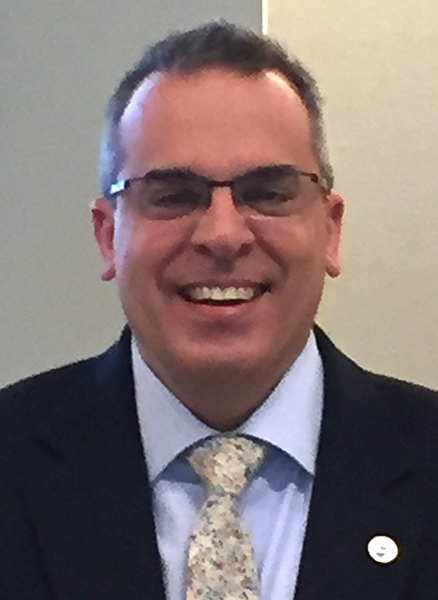
|
David R. Vallee, Hydrologist-in-Charge, NOAA/NWS/Northeast River Forecast Center |
For our 44th Annual Meeting and Environmental Conference, CACIWC has scheduled our keynote speaker presentation at 9:00 AM immediately following a brief introduction and business meeting at 8:45 AM. The keynote presentation will be followed by our workshops, with five minutes breaks at the end of each session. The conference will end at 2:30 PM.
We are pleased to welcome David R. Vallee of the National Oceanic and Atmospheric Administration (NOAA) National Weather Service (NWS) Northeast River Forecast Center to serve as our 2021 Annual Conference keynote speaker. Much of New England has been experiencing an increasing trend in annual average temperature and annual average precipitation over the past several decades. During this same time period, the region has experienced an increasing number of moderate to major flood episodes. These episodes have been associated with a variety of storm types and have affected the region at different times of the year, but the most potent of these have been associated with tropical systems. The common threads in each episode were the ability of each storm system to move slowly and tap into a deep tropical moisture source which resulted in very heavy if not record rainfall amounts. This presentation will review current trends and will examine recent storms such as Florence, Henri and Ida as examples of our increasing vulnerability to such high impact events. The presentation will end with a brief look at new prototype services under development by the National Weather Service to provide forecasts of inundation to Emergency Managers. David R. Vallee Biography: David Vallee is the Hydrologist-in-Charge of the National Weather Service’s Northeast River Forecast Center. The center provides water resource and life-saving flood forecasting services to hundreds of federal, state and local water resource partners throughout New York, New England and neighboring Canada. David has worked for the National Weather Service for 34 years, serving in a variety of positions including Intern Meteorologist from 1987-1993, Senior Service Hydrologist at the Taunton Weather Forecast Office from 1993-2000 and as their Science and Operations Officer from 2001-2006. David has extensive experience leading hydrometeorological forecast and warning operations and directing weather research and training programs. Research topics have included New England Hurricane Behavior and Climate Change Impacts on Flood Frequency and Severity. David most recently led a Department of Commerce Agency Priority Goal to: Mitigate Flood Impacts by Demonstrating Improved Decision Support Services to Emergency Managers. |
Workshops
Workshop 1. “Municipal Activities to Promote Waste Reduction and Recycling”
Kim O’Rourke, Middletown Recycling Coordinator & municipal panel Ms. O’Rourke will pick up from the discussions at our Mid-Year Conference to explain how municipalities have responded to recent legislative initiatives and accepted the challenges of promoting new waste reduction and recycling in her presentation, “What’s Happening with Trash in Connecticut?” Kim will then introduce the other speakers on the panel who will describe cutting edge waste reduction and recycling programs.Howard Weissberg, P.E., Director of Public Works, City of Meriden Mr. Weissberg will present on “Meriden’s Solid Waste Co-Collection Waste Reduction Pilot Program” Doug Coulter, C.F.M., Grants Administrator, Project Manager, and Flood Plain Manager for the City of West Haven Mr. Coulter will review “Adding Food Waste to Municipal Composting Operations & School Food Waste Education” Jennifer Heaton-Jones, Executive Director, Housatonic Resources Recovery Authority Ms. Jones will discuss “How Municipalities can Share Responsibility of Materials Management through Extended Producer Responsibility (EPR)” Presenters will highlight how local commissioners can promote these concepts within their region.
Workshop 2. “Wetlands Law: Legal Problem Solving 2.00 – second edition
Janet Brooks, Attorney at Law, LLC
with Darcy Winther, Connecticut Department of Energy and Environmental Protection (DEEP)
Janet Brooks will be assisted by DEEP wetlands municipal liaison Darcy Winther, who will also play devil’s advocate. Appropriate for newer and experienced wetlands commission members.
Workshop 3. “Emerald Ash Borer and Spotted Lantern Fly”
Claire Rutledge, PhD, Associate Agricultural Scientist, Department of Entomology, The Connecticut Agricultural Experiment Station (CAES) Dr. Claire Rutledge obtained a BA in Biology from Oberlin College before receiving her MS and PhD in Entomology at the University of Illinois Champaign Urbana. After post-doctoral stints at University of Idaho and Purdue University, she accepted her current position at The Connecticut Agricultural Experiment Station. Her research has focused on wood boring insects, including emerald ash borer.
Workshop 4. “Water 101 – Understanding the science of water to help you protect your community resources”
Virginia de Lima, former Director of the USGS Connecticut Water Science Center Virginia de Lima is the former Director of the USGS Connecticut Water Science Center and, though retired, continues to serve on multiple state committees focused on the State Water Plan (SWP). She is co-chair of the SWP Implementation Committee and previously chaired the Science and Technical Committee, which was active during the development of the plan. Virginia’s technical work at the USGS was in computer simulation of groundwater flow. She taught groundwater modeling for the USGS and also taught Groundwater Hydrology in the Environmental Engineering Department at the University of Hartford.
|
Schedule for the Day:
Welcome & Business Meeting
8:45 – 9:00 am
Keynote Speaker & Discussion
9:00 – 9:55 am
Break 1
9:55 – 10:00 am
Workshop 1 Waste Reduction & Recycling
10:00 – 10:55 am
Break 2
10:55 – 11:00 am
Workshop 2 Wetlands Law: Problem Solving
11:00 am – 12:25 pm
Break 3
12:25 – 12:30 pm
Workshop 3 Emerald Ash Borer & Spotted Lantern Fly
12:30 – 1:25 pm
Workshop 4 Water 101, CT Water Resources
1:30 – 2:25 pm
Conference ends 2:30 pm
Annual Report & Conference Brochure
Click Here to view Sponsorship Opportunites
For information on our Annual Meeting, please email us at: AnnualMtg@caciwc.org
* * * * * * * * *
